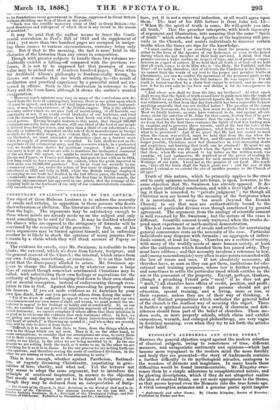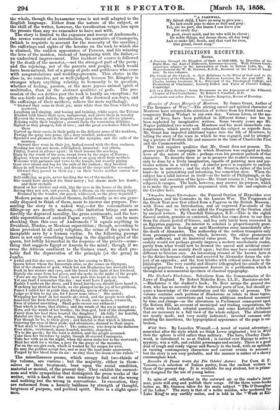KINGSLEY'S ANDROMEDA AND OTHER POEMS. * BESIDES the general objection urged
against the modern selection of classical subjects, owing to remoteness of time, different manners, and antagonistic sentiments and opinions—which last become more repugnant to the modern mind the more forcibly and truly they are presented—the story of Andromeda contains a further difficulty in its mythological miracles, analogous to the wonders of daemons and magicians. In many hands these difficulties would be found insurmountable. Mr. kingsley over- comes them by a simple adherence to unsophisticated nature, and by glowing descriptions, which if they do not altogether realize the idea of classical finish, are yet more appropriate to the theme, as that passes beyond even the Homeric into the true heroic age. A vivid conception animates and a genuine poetic spirit inspires • Andromeda and other Poems. By Charles Kingsley, Rector of Eversley. Published by Parker and Son.
the whole, though the hexameter verse is not well adapted to the English language. Either from the nature of the subject, or the skill of the writer, however, the versification verges less upon the prosaic than any we remember to have met with.
The story is limited to the exposure and rescue of Andromeda; the scenes consist of an introduction, the narrative of Cassiopceia, (which is requisite to account for the necessity of the sacrifice,) the sufferings and sights of the heroine on the rock to which she is chained, the sudden appearance of Perseus, and his winning the love of the maiden, instead of bargaining with the father,— an undoubted improvement. This incident of course is followed by the death of the monster,—not the strongest part of the poem ; and the rejoicing, not of the parents and people, which would have been natural, but of a group of gods and goddesses who come with congratulations and wedding-presents. This choice in the Close is, we conceive, not so well-judged, because Mr. Kingsley is stronger where anything relating to humanity is in question, whether of feeling, passion, or the mere joyous animal spirit of multitudes, than in the abstract qualities of gods. The pro- cession of the sea deities past the rock is hardly an exception ; for the sea-birds and fishes, the spirits of the drowned sea-boys, and the sufferings of their mothers, relieve the mere mythology.
" Onward they came in their joy, more white than the foam which they scattered, Laughing and singing, and tossing and twining, while eager, the Tritons Blinded with kisses their eyes, unreproved, and above them in worship Hovered the terns, and the seagulls swept past them on silvery pinions, Echoing softly their laughter ; around them the wantoning dolphins Sighed as they plunged, full of love ; and the great sea-horses which bore. them Curved up their crests in their pride to the delicate arms of the maidens, Pawing the spray into gems, till a fiery rainfall, unharming, Sparkled and gleamed on the limbs of the nymphs, and the coils of the mermen.
Onward they went in their joy, bathed round with the fiery coolness, Needing nor sun nor moon, self-lighted, immortal : but others, Pitiful, floated in silence apart ; in their bosoms the sea-boys, Slain by the wrath of the seas, swept down by the anger of Nereus ; Hapless, whom never again on strand or on quay shall their mothers Welcome with garlands and vows to the temple, but wearily pining Gaze over island and bay for the sails of the sunken ; they heedless Sleep in soft bosoms for ever, and dream of the surge and the sea-maids. Onward they passed in their joy ; on their brows neither sorrow nor anger ;
Self-sufficing, as gods, never heeding the wo of the-maiden.
She would have shrieked for their mercy ; but shame made her dumb ; and their eyeballs
Stared on her careless and still, like the eyes in the house of the idols. Seeing they saw not, and passed, like a dream, on the murmurinr, ripple. Stunned by the wonder, she gazed, wide-eyed, as the glory departed."
Modern poems on classical themes, indifferently as we are gene- rally disposed to think of them, seem to answer one purpose. Pre- senting the story in a naked way,—for the concomitants or fillings-up are mostly modern,—the imitation brings out more forcibly the depraved morality, the gross sentiments, and the hor- rible superstitions of ancient Pagan society. What can be more shocking than this case of Andromeda ? it equals anything in Druidical, Hindoo, or Mexican superstition ; though, according to , ideas prevalent in all early religions, the crime of the queen was inexpiable save by a human victim. In the following. passage there is not only something touching in the dignified grief of the 'peen, but loftily hierarchal in the response of the priests—some- thing that suggests Egypt or Assyria to the mind; though if we cross the African continent to the Guinea coast, we shallpro- bably find the depravation of the principle (or the germ) in Jumbo.
" Awful and fair she arose, most like in her coming to Hebe,
Queen before whom the Immortals arise, as she comes on Olympus, Out of the chamber of gold, which her son Hephtestos has wrought her. Such in her stature and eyes, and the broad white light of her forehead. Stately she came from her place, and she spoke in the midst of the people. Pure are my hands from blood ; most pure this heart in my bosom. Yet one fault I remember this day : one word have I spoken ; Rashly I spoke on the shore, and I dread lest the sea should have heard it. Watching my child at her bath, as she plunged in the joy of her girlhood, Fairer I called her in pride than Atergati, queen of the ocean. Judge ye if this be my sin, for I know none other.' She ended ; Wrapping her head m her mantle she stood, and the people were silent. Answered the dark-browed priests, ' No word, once spoken, returneth, Even if uttered unwitting. Shall gods excuse our rashness ? That which is done, that abides ; and the wrath of the sea is against us ; Hers, and the wrath of her brother, the Sun-god, lord of the sheepfolds. Fairer than her heat thou boasted thy. daughter ? Ah folly ! for hateful, Hateful are they to the gods, whew, impious, liken a mortal, Fair though he be, to their glory ; and hateful is that which is likened, Grieving the eyes of their pride, and abominate, doomed to their anger. What shall be likened to gods ? The unknown, who deep in the darkness Ever abide, twyformed, many-handed, terrible, shapeless. We to the queen ; for the land is defiled, and the people accursed. Take thou her therefore by night, though ill-starred Cassiopreia, Take her with us in the night, when the moon sinks low to the westward; Bind her aloft for a victim, a prey for the gorge of the monster, Far on the sea-girt rock, which is washed by the surges for ever. So may the goddess accept her, and so may the land make atonement, Purged by her blood from its sin : so obey thou the doom.of the rulers.' "
The miscellaneous poems, which occupy full two-thirds of the volume, are various ; but the majority, either in them- selves or their treatment, bear upon the social condition, material or mental, of the present day. They exhibit the earnest- ness and wide sympathies that distinguish the prose works of the writer, with a dash of the same tendency to find out the wrong and nothing but the wrong in conventions. In execution, they are redeemed from a. homely baldness by strength of thought, largeness of purpose, and poetical spirit. Here is a slight speci- men.
"A PAILEWELL.
My fairest child, I have no song to give you ; No lark could pipe to skies so dull and grey: Yet, ere we part, one lesson I can leave you For every day.
Be good, sweet maid, and let who will be clever; Do noble things, not dream them, all day long : And so make life, death, and that vast for ever, One grand, sweet song."



























 Previous page
Previous page